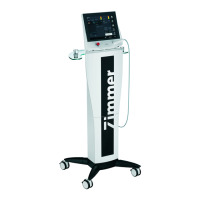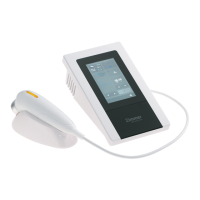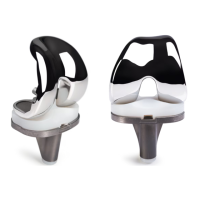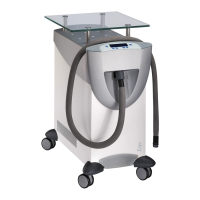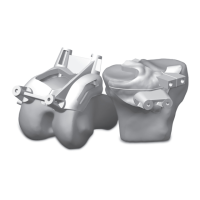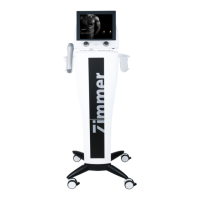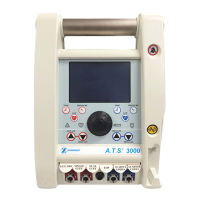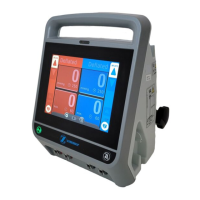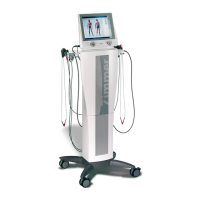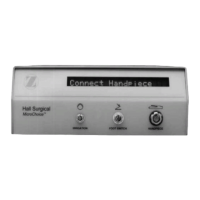Do you have a question about the Zimmer Opton Pro and is the answer not in the manual?
Identifies and illustrates the main components visible on the front of the device.
Shows and labels the ports and connectors located on the rear of the device.
Explains the different views, menus, and navigation elements of the device's screen interface.
Presents visual representations and names of optional or included accessories for the device.
Provides instructions on the proper disposal of the device and related batteries according to regulations.
Defines the meaning and usage of caution, warning, and danger symbols in the manual and on the device.
Details the conditions and situations where the use of the OptonPro 25W is strictly prohibited.
Outlines potential risks and negative reactions that may occur during or after treatment with the device.
Explains the meaning of safety symbols and terms used throughout the manual for user guidance.
Provides essential safety instructions regarding electrical hazards, maintenance, and device operation.
Covers safe operating environments, careful handling of sensitive components, and risks with flammable materials.
Details the severe hazards associated with Class 4 laser radiation, especially to the eyes, and required protective measures.
Specifies user qualifications, patient suitability criteria, and general information required for safe operation.
Lists specific operational rules, restrictions on accessories, and requirements for protective eyewear.
Offers initial advice on familiarizing with instructions, power connections, and device positioning for use.
Details safety equipment, workspace setup, and operational components like the test sensor and warning signs.
Addresses safety considerations for the treatment room environment and the proper use of device spacers.
Provides a concise summary of what the OptonPro 25W is and its fundamental purpose in therapy.
Outlines critical safety steps that must be taken before the device is powered on and used.
Guides users through connecting power and interlock cables and the initial device startup procedure.
Explains various settings configurable via the device's menu, such as language and display options.
Details how to set access codes and configure the manual switch operation modes for the laser.
Covers device maintenance, setting date/time, and managing treatment data via USB.
A step-by-step guide detailing how to initiate and conduct a therapeutic treatment session.
Describes the various elements on the device's display screen and their corresponding functions.
Explains how to use the Visual Analogue Scale for recording patient pain levels before and after treatment.
Covers accessing patient treatment history and configuring skin temperature monitoring limits.
Details how to monitor total energy output and perform a daily performance test for system integrity.
Provides instructions on how to perform the thermal threshold test to determine optimal laser power settings.
Explains methods for selecting appropriate therapeutic protocols based on body regions or treatment lists.
Guides users on how to save, edit, and manage frequently used treatment programs as favourites.
Lists key technical parameters of the OptonPro 25W, including wavelengths, power, and density.
Provides physical dimensions, laser safety class, environmental operating conditions, and regulatory compliance.
Details the essential steps for cleaning and disinfecting the device, applicator, and accessories.
Contains contact details and addresses for the manufacturer Zimmer MedizinSysteme and its distributor.
Lists all components included in the standard package and available optional accessories.
Discusses device compatibility and adherence to crucial safety regulations like IEC 60601-1.
Outlines the steps required to conduct a functional test to ensure the device operates correctly before use.
Provides a guide to identifying and resolving common error messages and device malfunctions.
Introduces the device's compliance with engineering rules and its intended use regarding EMC.
Details the device's electromagnetic emissions and the guidelines for its use in various environments.
Explains the device's immunity to electromagnetic interference and the compliance levels for various tests.
Specifies the device's immunity levels against radio frequency communication equipment based on specific test parameters.
| Aiming beam | 635 nm |
|---|---|
| Display | touchscreen |
| Power supply | 100-240 V, 50/60 Hz |
| Laser type | GaAlAs diode laser |
| Operating modes | CW (continuous wave) and pulsed |
